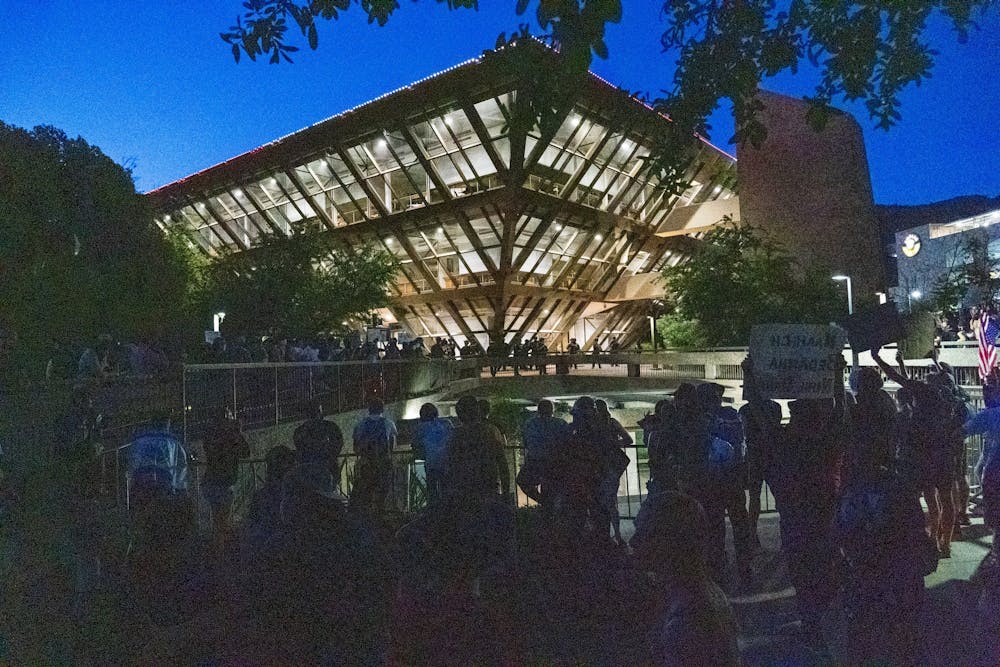The new economic crisis, stemming in part from the coronavirus pandemic, has sent cash-strapped universities and local governments reeling, the city of Tempe and ASU included.
Municipalities seeing an ebb in business and universities seeing an ebb in enrollment are finding that the budgetary pie is only so big. However, the cuts in spending don't seem to be shared equally among the people.
Tempe is reducing funding appropriated to fire, park maintenance and recreation programs. The Tempe Police Department is seeing a cut too, but the government claimed that this move was an inevitability borne of the economic downturn, not a concession to demands to defund the police.
Some social services are "recommended" to be spared from the budget adjustments, but I wonder why these services are at risk of being cut, or why they are not funding priorities in the first place, given that their demand is now even higher nationwide.
Tempe has gone out of its way to attract businesses by granting unpopular tax incentives, some of which were improper. With this in mind, why can't Tempe shareholder dividends and CEO salaries take a budget cut? Why do Tempe city employees and people in need of government services need to tighten their belts and be more frugal, but not the rich?
John Adamson, a junior studying political science and social chair of Young Democrats at ASU said that city budget cuts do not solve underlying problems in Tempe.
"To me, austerity is not an answer," Adamson said. "By making these cuts, the city is only hampering issues that they had before (the economic crisis), and will still have afterwards."
Adamson says that Tempe businesses should bear the burden instead, given the tax breaks and incentives used to draw these businesses into the city.
"Attracting new business to the area is good, but it shouldn't come at the expense of everyone else," Adamson said. "I think that they're obliged to pay — you know, we gave you a tax break to bring you here, now that we need some money, we're sort of expecting some payback there."
Adamson says students will ultimately be affected by these city cuts too, and that they should pay attention to how the budget is drawn up.
"The way the local government is working and its effect on the budget affects students," Adamson said. "College feels like its own thing, but the changes that the city is proposing will ultimately affect us in the end."
The argument behind austerity measures appeals to the instinct that we all need to do our part. By agreeing to cut out frivolous spending and to make do without luxuries, and living more austerely, we can soldier out of the crisis and back to a state of economic prosperity.
In reality, this argument is purely ideological: We don't all do our part, and only the workers and the poor end up paying. Far from frivolity, cut spending funds programs that people need to survive.
A similar, fallacious logic is currently being applied to universities. Already facing financial difficulties, the coronavirus pandemic has forced campus closures and heavily reduced enrollment.
In response, universities are choosing to lay off thousands of workers while maintaining high tuitions, in some cases demanding in-person tuition for an online curriculum. ASU is facing a class-action lawsuit for not refunding tuition, offering only a meager $1,500 housing credit for students who had to move off campus.
John Reuss, a former ASU student now transferring to a new university, says that the lack of reimbursement was part of his move out of Arizona.
"I had decided that I was transferring before the pandemic started," Reuss said, "but the state's and University's botched responses meant that I didn't get refunded basically anything — room and board, not even a meal plan."
Reuss also says that cutting services to students in order to save costs makes ASU less appealing to students.
"The administration's response to this crisis doesn't benefit students in any way," Reuss said. "It'll end up doing a lot of harm if they're cutting services and moving online."
As an out-of-state student, Reuss says the combination of mismanagement by the Arizona state government and what he says is a botched response by University officials made returning in the fall less appealing.
"After the whole pandemic response and then withholding funding for students, and Arizona's botched like response tom, it doesn't, you know, it makes me not want to go there," Reuss said.
"I mean, if I hadn't decided before the pandemic that I was going to transfer, I definitely would have decided to transfer out of ASU."
As a fellow out-of-state student, I definitely see where Reuss is coming from. Returning to a school in a heavily coronavirus-afflicted state is daunting, especially when the University is offering little relief.
Not only will full tuition be demanded, but even much-maligned fees will remain on the pretense of the University offering socially distant alternatives to services like the fitness center. Of course, I fully expect Michael Crow to take his full salary this year — no budget cut expected there.
Cuts to services, whether in our cities or in our universities, disproportionately harm people who already receive very little support from public institutions. These measures are based on the deception that we collectively bear responsibility for financial crises.
In the face of this economic downturn, students and community members should reject budget cuts and ask the rich to pay their share.
Reach the columnist at smisceni@asu.edu or follow @IMiscenich on Twitter.
Editor’s note: The opinions presented in this column are the author’s and do not imply any endorsement from The State Press or its editors. John Adamson was a columnist for The State Press in 2019. He was not involved in the reporting or editing of this story.
Want to join the conversation? Send an email to opiniondesk.statepress@gmail.com. Keep letters under 500 words and be sure to include your university affiliation. Anonymity will not be granted.
Like The State Press on Facebook and follow @statepress on Twitter.




